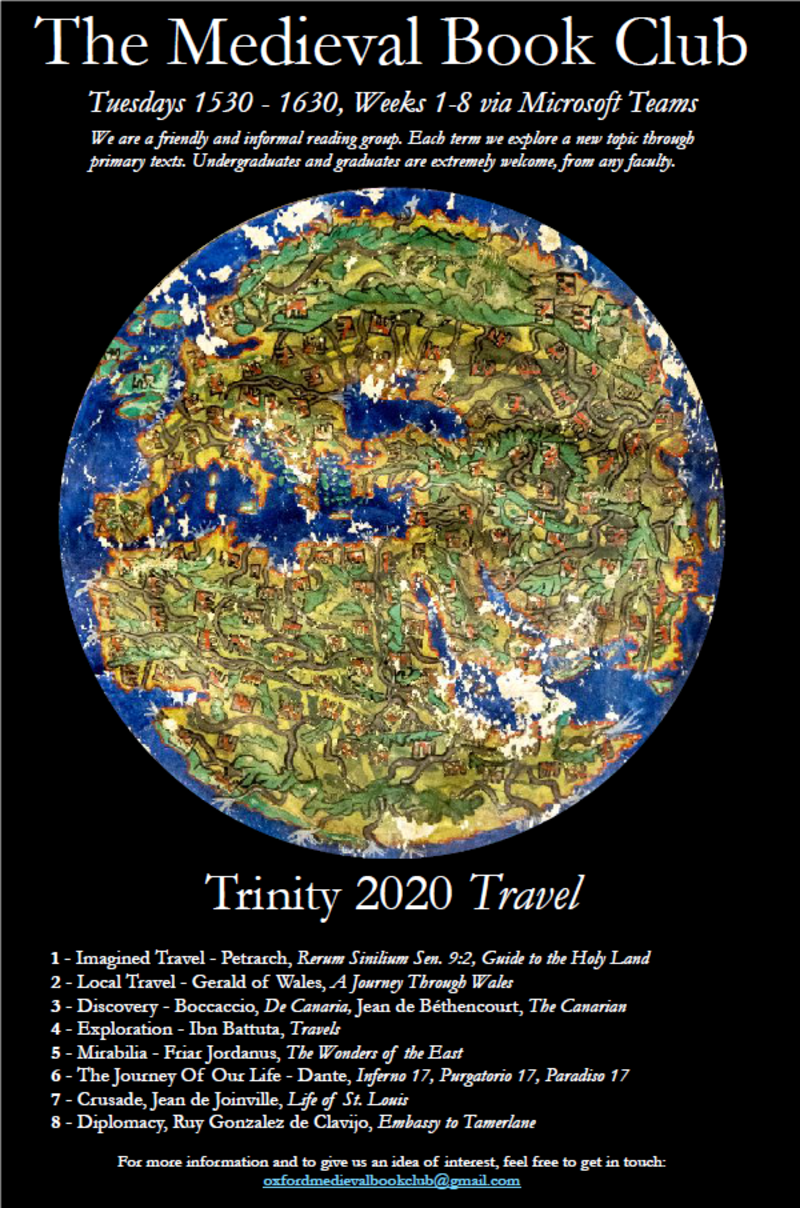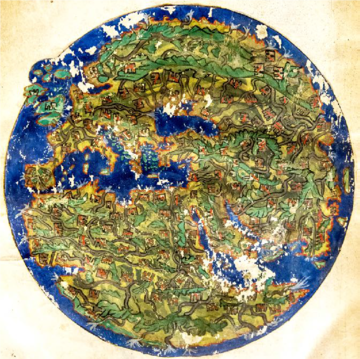The Medieval Book Club Goes Virtual
Neither pestilence nor foul weather has stopped the Medieval Book Club from continuing to meet. Nobody had to brave the foul weather on Tuesday to attend our first meeting of Trinity Term 2020, since the Medieval Book Club has transitioned online for this term. As to pestilence, plague was considered as a possible theme for this term’s readings. However, the committee demurred toward the more tactful course of exploring medieval texts concerned with travel. One can be too relevant.
Already, though, the theme has proven not quite irrelevant. In the opening lines of his Itinerarium, our first reading, Petrarch avers, ‘Rarely do things come out according to our hopes. Often what is planned does not take place, and the unhoped for happens.’[1] The original plan for the Medieval Book Club certainly could not have included meetings via Microsoft Teams, with the channel kindly provided by Oxford Medieval Studies, and with participants so far joining from Italy and London (and even attempting to join from across the Atlantic, although prevented by technical issues), as well as from various corners of Oxford. These virtual meetings nonetheless fit the club’s aim to provide a friendly forum for engaging with medieval texts on their own terms.
Established in Hilary Term 2018 by three DPhil students fresh from the MSt in Medieval Studies, the club has welcomed participants from across a range of subject specialties – History, English, Medieval and Modern Languages, and Music – and across Oxford’s demographics – undergraduates and independent scholars, postgraduates and community members, Junior Research Fellows and visiting scholars. We are delighted to be able to welcome some of these visiting scholars back for our online meetings. We are also delighted to have Jose Andres Porras convening this term along with Alex Peplow, Audrey Southgate, and Henry Tann. Like its participants, the club’s topics have varied.
Thus far, we have looked at medieval writing concerned with (You will find the termcards for the previous terms in the linked-in OMS booklets for the respective terms): Animals (HT Spring 2018), Autobiography (TT Summer 2018), Apocalypse (MT Autumn 2018), Deviance (HT Spring 2019), Friendship (TT Summer 2019), Comedy (MT Autumn 2019), and the Sea (HT Spring 2020). The latter has furnished a fitting prelude to this term’s readings on Travel (TT Summer 2020).
In another letter, this time to Francesco Bruni, Petrarch elaborates the tension between learning by travel abroad and learning by study in his library, finding there is not time for both. As he recalls in this letter, Petrarch settled on a resolution to his dilemma that would enable him to travel without leaving his library:
I decided not to travel just once on a very long journey by ship or horse or on foot to those lands, but many times on a tiny map, with books and the imagination, so that in the course of an hour I could go to those shores and return as many times as I liked, to those distant shores, not only unscathed, but unwearied too, not only with sound body, but with no wear and tear to my shoes, untouched by briars, stones, mud and dust.[2]
If Petrarch’s experience is anything to go by, perhaps this term’s readings will provide an antidote to stifled wanderlust.
We are looking back with nostalgia on sunny afternoons musing on friendship in the Fellow’s Garden at Merton last Trinity Term. And we are looking forward to gathering in person again, sooner or later. But for the meantime, we hope ‘you, who are located in one spot as is seemly for monks’ (and other scholars) will join us to ‘traverse in your minds that which the travel of others has assembled with very great labour’.[3]
The termcard is included below for your perusal, and you can email oxfordmedievalbookclub@google.com with any queries.
1 - Imagined Travel - Petrarch, Rerum Sinilium Sen. 9:2, Guide to the Holy Land
2 - Local Travel - Gerald of Wales, A Journey Through Wales
3 - Discovery - Boccaccio, De Canaria, Jean de Béthencourt, The Canarian
4 - Exploration - Ibn Battuta, Travels
5 - Mirabilia - Friar Jordanus, The Wonders of the East
6 - The Journey Of Our Life - Dante, Inferno 17, Purgatorio 17, Paradiso 17
7 - Crusade, Jean de Joinville, Life of St. Louis
8 - Diplomacy, Ruy Gonzalez de Clavijo, Embassy to Tamerlane
For more medieval matters from Oxford, have a look at the website of the Oxford Medieval Studies TORCH Programme

[1] Francesco Petrarca, Petrarch’s Guide to the Holy Land, trans. T.J. Cachey (Notre Dame, Ind.: University of Notre Dame Press, 2002), Pr.1.
[2] Francesco Petrarca, Sen. 9, 2, Letters of Old Age: Rerum Senilium Libri I-XVIII, 2 vols., trans. Aldo S., Bernardo, Saul Levin, and Reta A. Bernardo (Baltimore: Johns Hopkins University Press, 1992), vol.1, p. 329.
[3] Cassiodorus, ‘Divine Letters’, no. 25, in An Introduction to Divine and Human Readings, trans. L. Webber Jones (New York: Octagon Books, 1966), p.125.



